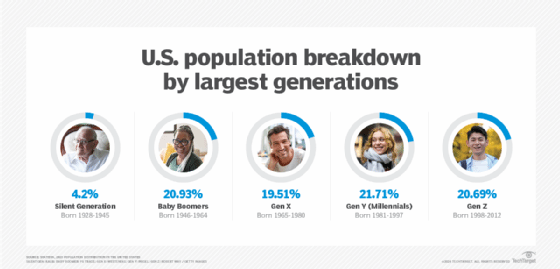
Getty Images
Gen Z career advice: What I learned from my first office job
Generation Z is stepping into the job market with innovative ideas and a diverse skill set.
Yes, it's true -- Generation Z has officially joined the workforce.
According to a study conducted by Johns Hopkins University, Gen Z is estimated to make up about 30% of the workforce by 2030, providing fresh ideas and an understanding of modern technology.
Generation Z employees have faced criticism and judgment in business settings based on the stereotype that they are unmotivated and underqualified. According to a 2023 survey done by Intelligent, 40% of business leaders believe recent college graduates are unprepared for the workforce, with 94% saying they avoid hiring recent graduates.
Every generation can bring value, communication and unique skill sets to office-related professions. Applying time and effort into learning and contributing to a business can help individuals develop their professional skills, get used to a modern-day career and find their passion. Internships are a great first step in building a work identity.
What is Gen Z?
Generation Z is commonly identified as those born between the years 1998 and 2012, though this estimate can vary depending on the source. This indicates the age range of Gen Zers is 12 at the youngest and 26 at the oldest. Gen Zers -- also known as Zoomers -- are the second-youngest generation, sandwiched between Millennials and Generation Alpha.
Along with facing many real-world challenges such as climate change, a global pandemic, and many civil and social issues, Gen Zers grew up during the beginning of many technological advancements and innovations. This has earned Generation Z the nickname "digital natives." According to a 2022 study by Statista, 40% of Zoomers spend more than four hours on social media platforms daily -- making them the most online-present generation so far.
Gen Zers have many other qualities besides being technologically inclined. A study by Pew Research Center on Generation Z qualities highlights Gen Z to be the most well-educated generation yet. They are also more socially accepting, progressive and pro-government.

Why is having an office internship important?
Internship opportunities come in many different forms and are recommended due to the out-of-classroom approach to learning professional skills. Even those who are unsure about their career path can benefit from interning in an office setting to explore more of their interests and aid in career development.
Some reasons to consider an office internship include the following:
- Gain invaluable experience. An office internship provides interns with entry-level experience in a professional setting. This experience can include learning business software, proper professional email etiquette or proper office etiquette.
- Develop skills. Interns develop skills in their early career that a person would not be able to on their own or in a classroom setting. For example, an intern in an office setting might learn how to properly use Microsoft tools or learn how to communicate their thoughts and ideas confidently.
- Networking opportunities. In an office internship, an intern can be surrounded by like-minded people to provide them with more insight on the job and what it entails. By talking and learning from different groups of people, interns can develop their professional identity and build long-lasting connections.
- Easy transition into the workforce. The transition from a part-time job or college student to a full-time job can be overwhelming. Internships provide a better idea of what to expect when starting a full-time job.
- Looks good on a résumé. The more relevant work experiences an applicant has, the more likely it is they will be considered for a job in the future. Internships help a person stand out in the business world when applying for jobs.
In an internship, there are many different things you will learn, whether it be about yourself, your work style or the career path that best works for you. Some Zoomers are reaching the age where this kind of career development is crucial to succeed in the workforce.
I had the opportunity to have my first office internship with TechTarget's centralized editorial team for the summer. In just a few months, even I was surprised at all I learned. Here are some lessons that have stuck with me as a Gen Zer -- and what others could benefit from knowing when searching for their first office internship.
You will get things wrong
One of the main fears when starting an internship is that you will mess up something. That was very much the case when I first started -- and it did happen. I became embarrassed if I did not know how to use certain software -- a common phenomenon for Gen Z known as tech shame -- or if I struggled with an assignment.
As I found out, this feeling usually subsides with time and patience. You are starting a new job that is different than any retail, food service or part-time position. And like all jobs, they take time to learn -- some more than others. I would often worry that the more mistakes I made, the more my peers would find me unfit for the job. But I found it to be quite the opposite. The more I asked questions, responded to feedback and tackled more difficult assignments, the more I felt competent and useful to others in the office.
Communicate, communicate, communicate
Communication is key in any relationship, and this holds true in the workplace. Sometimes it is easy to assume people will understand where you are or what you are doing without having to say it, but this is usually untrue. When I started making sure to communicate my thoughts, ideas, whereabouts, plans and questions, work became a whole lot easier.
Regularly communicating with co-workers and mentors builds a sense of trust in work-related relationships. If you have a hybrid or remote work position, digital communication is crucial in keeping in touch and staying up to date with office matters. Whether I was working remotely or in-person, I took the initiative of talking through my daily tasks with my mentor and the order in which I planned on doing them. In return, she communicated the order she expected assignments done and talked through future ones for which I could prepare.
Try everything
When I learned about the company's video production team during my internship, I was certain I would never be in front of the camera. When I was offered, I politely declined and explained that I am not comfortable being on screen. It wasn't until my mentor suggested I give it a go to complement my communications minor that I eventually agreed.
Luckily for me, the people working with me were very kind and patient and I was able to get through it easily. After that, I was comfortable when it came to accepting new assignments.
The goal of having an internship is to learn everything you can in a short period of time. Even if there are opportunities that don't particularly interest you, consider them. It could be a nice résumé builder.
Update your LinkedIn profile
Embarrassingly enough for a Generation Z employee, I forgot that jobs often look for your social media presence before you even start -- especially LinkedIn. The part-time positions I worked at previously did not look for such things, so I mistakenly put it out of my mind.
It wasn't until my first day that my mentor turned to me and said, "You should really update your LinkedIn profile," that I realized I hadn't made changes to my account since my sophomore year of college -- and it wasn't even complete.
According to 2024 statistics by LinkedIn, candidates with a complete and comprehensive profile were 71% more likely to land a job interview, as many recruiters look for profiles on LinkedIn to determine how relevant they are for the job.
Always trace information back to the original source
As a relatively new writer and editor, when writing articles, I would look for time-relevant, trustworthy statistics, surveys and reports that best fit my idea without understanding who originally posted them. When I was told that some of my sources were either incorrect or not easily accessible, I realized how important it was to trace information back to the original source. If your audience reads a statistic you posted and later finds it to be false, you risk losing your audience and risk the credibility of the business.
Some helpful tips for finding original sources include the following:
- Check for links. Usually when an article publishes findings from another source, there will be a link to the actual study highlighted in blue. Click on the link to see if the article linked is the original source or if there is a link on that page for the findings. Sometimes you will go down a rabbit hole of different sources, but if you cannot find the original in the end, consider finding something else.
- Read studies and reports thoroughly. Even if the findings look good at first glance, make sure to fully read through the source and its findings thoroughly. Sometimes, the data might be more complicated and more unrelated to your subject than originally thought.
- Check the dates. Some information that might fit very well in your piece might unfortunately be out of date. A general rule is to look for studies that are no more than three years old.
- Consider using Google Scholar. Google Scholar is a personalized search engine that gives users real, reliable scholarly sources based on your search. The National Library of Medicine cites Google Scholar in a journal for being a commonly used research search engine that catalogs between 2 and 100 million academic and literary sources.
ChatGPT isn't just a tool for cheating
ChatGPT -- hated by teachers and loved by students. I always stayed away from the platform as I heard people used it to write essays and help with homework. Because writing is a big part of my major, I felt using it at all would make me some kind of fraud.
Writers have a love-hate relationship with generative AI due to the belief that it will one day steal jobs like ours, so I was surprised when I was told to try it. Artificial intelligence -- being a common topic of conversation at TechTarget -- was important for me to understand. I learned that ChatGPT does more than write essays. If I was confused by a topic, I could ask ChatGPT to explain it. If I had trouble wording a sentence, I could see how ChatGPT would write it. Just be sure not to copy or rely on the platform entirely. It still gets things wrong.
Ensure quality and accuracy
As an intern, you want to show your capabilities through your work. Deadlines can make this tricky at times. When I was close to a deadline in the beginning, I would often rush through my work to make sure it was done in time -- and it showed.
Mentors typically understand that an internship is a learning experience, and the intern might take extra time to get things done. My mentor was no different, as she assured me that she would rather things be done accurately than quickly. Once I was more comfortable, discussing when I felt I could get assignments done with my mentor was a huge help -- and my work was much better.
Bring a backup outfit
A white blouse looks great until you hit a speed bump on the way to work with coffee in your hand. I learned my lesson after not once, but twice, running into this issue and having to scrub what I could off in the bathroom. For my fellow clumsy Gen Z workers, take it from me -- leave a change of clothes in your car.
Samantha Poutre is an editorial assistant at TechTarget and a student at Roger Williams University. She studies creative writing at Roger Williams with a minor in global communications. She has served as an editor for two of her university's newspapers and enjoys participating in clubs involving writing and the arts.







